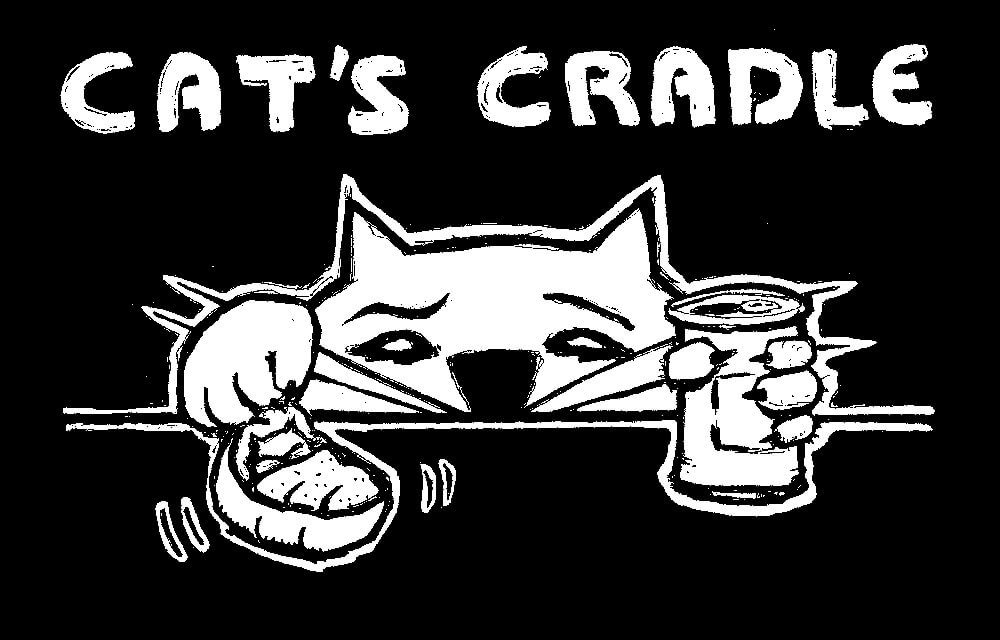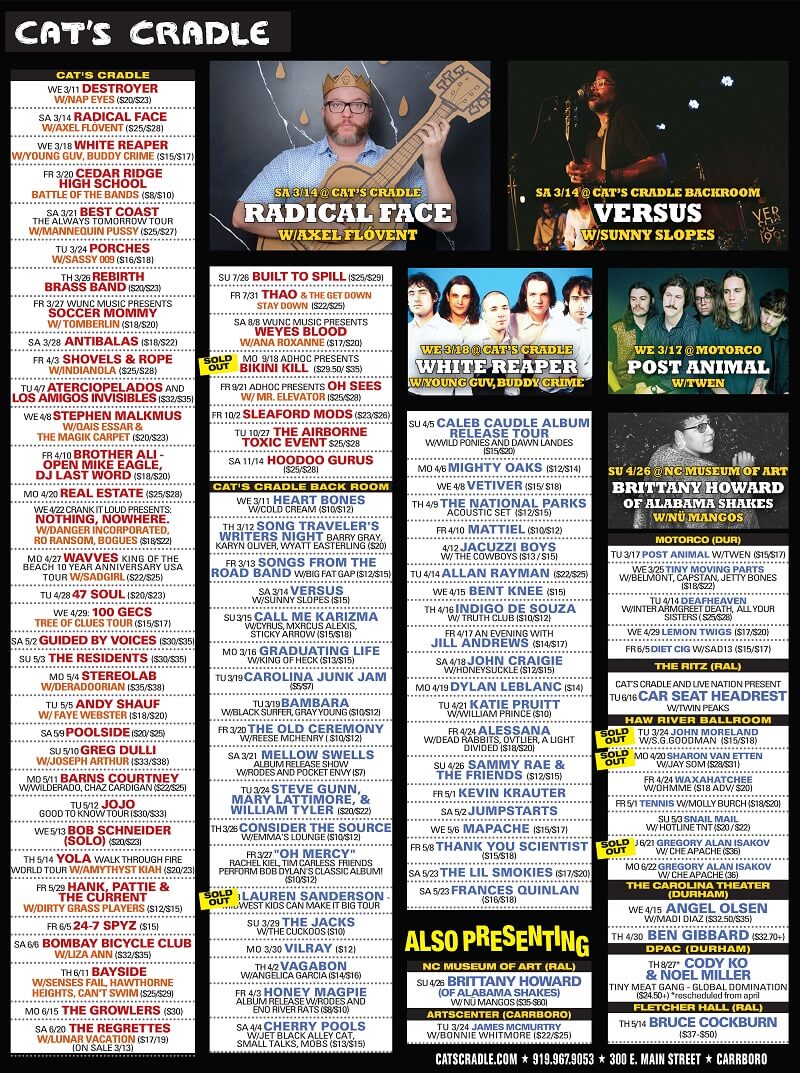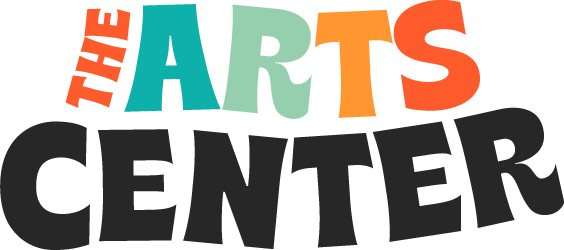The ArtsCenter’s new interview miniseries “Venues in a Pandemic” talks with venue owners and operators in our community about the ways the COVID-19 pandemic and subsequent relief efforts have affected them and their work as presenters of live music. Interview by Patrick Phelps-McKeown.

Frank Heath is the owner of Cat’s Cradle, an iconic Carrboro music venue that is also The ArtsCenter’s neighbor in East Main Square. We spoke to Frank about the challenges posed by COVID and how the Cradle has found creative ways to continue operating and supporting musicians over the last year.
It’s been almost a year of pandemic in the US at this point. When was the last in-person show you did?
FH: The last show we hosted was Songs From the Road Band, who played on March 13, 2020 at the Cradle Back Room. That was a nervous evening. Everyone was very careful about where they walked and what they touched.
Our main room show for the following night (March 14) was Radical Face, and it was cancelled, as was VERSUS in the back room. The last main room show that took place was Destroyer, on March 11. We had about 70% attendance that night, in terms of which people who had purchased advance tickets actually showed up.
I’ve attached our Indy ad from that Wednesday, as a historical document (see below).
When did you realize how serious COVID-19 was going to be and start rescheduling shows?
FH: At about 8:30 PM on March 11, when the NBA stopped all games and cancelled its season, based on Rudy Gobert’s positive diagnosis. For the next week basically all I & the Cradle staff did was field communications from agents about postponing shows, refunding tickets, updating websites… at first there were a lot of postponements for a just month or two. Then once we got into April — they started wanting to move show dates further out.
How has your venue adapted to not being able to have in-person shows? What are some challenges and successes from having to change how you present music?
FH: The most important success has been that we slowly and carefully learned that people can still do things during this pandemic, if they are very vigilant about following health guidelines and protocols — and respecting how the virus spreads. I also learned quickly that our tech & show setup staff have some impressive IT and creative skills, which have helped to make most of our live streams go very well. This period of nearly a year has been pretty much a dry well in terms of direct revenue from actual concerts. But it has become clear that there are a lot of potential angles for content delivery that nobody really paid much attention to before COVID made it necessary to get creative in order to keep from going crazy. Bottom line is – people love to create, deliver and consume music & other forms of entertainment, even if it does not involve a financial payout.
What is one thing you wish the general public understood about what venues are experiencing right now?
FH: I think it’s not clear or obvious to a lot of people that we are an industry that is kind of like an aircraft carrier, in that it cannot start and stop on a dime. Most artist tours are a year or more in the making, in terms of, the band takes into consideration that—for example—it wants to get on the road when its latest album has just come out, or at a certain point when students will be back in at colleges, et cetera, so a lot of pieces go into determining when they are going to tour. Then, once an artist says they want to hit the road—setting up that tour takes a couple more months for agents to set up, trying to fit all dates together around the country to make it a workable routing. Then once you have a date set, three or four or six months in advance, a ton of logistical work and resources will go into announcing and promoting the show.
And all of this planning and logistical work, it has to happen 400 times a year for a promoter like Cat’s Cradle, since we book two clubs and other venues, just for the entire operation to stay afloat financially. Because of all this, most venues and concert promoters have been really unable to know or predict much about when concerts will start up again, or in what form. It’s just an unfortunate reality that until it becomes 98% clear that “six months from now, things are going to be 100% open in most places” the model for clubs won’t work very well, and we are not going to even begin putting shows back on sale.
In general, I’d say that the public has been quite supportive of Cat’s Cradle & other venues, especially in consideration of how hard-hit a lot of people have been as individuals.
What needs to happen to keep venues afloat?
FH: Well, the Save Our Stages act was included in the December 2020 stimulus package which passed, and that grant money will basically cover all of qualifying venues’ expenses thru the end of this year at least. We just need to cross our fingers that the SBA is able to accurately identify which venues have been the most hard hit and help those first. So—assuming that happens as it was intended, and that the grant program begins to actually distribute those funds soon—a large proportion of venues that provide part of the backbone of the live music ecosystem will be able to access life support at least through the end of this year. It is not going to be an easy task for the SBA, though, since there are thousands of venues that have been dark for going on a year; and there are tens of thousands of other businesses that incorporate elements of live music and may also qualify or come close to qualifying for these grants. So, we will still have to wait and see on that.
You’ve helped spread the word about NIVA and the Save Our Stages Act. Could you talk about this and how advocacy changed things for venues?
FH: The creation of NIVA in April ’20 provided a critical glimmer of hope for music venues when things were looking really bad. Dayna Frank, owner of First Avenue Club in Minneapolis, made the concept a reality, and Dayna has served as a guiding star for the organization throughout. But many, many others have brought endless passion, determination and expertise to the NIVA effort. I think the main reason that it succeeded, when so many efforts to influence legislative policies don’t, is that NIVA has always taken the attitude that EVERYONE who has supported live music as a venue has to be included in any sort of financial rescue program. It can’t just be about the First Avenues and 9:30 Clubs — because without smaller venues like (for example) Local 506 and The Kraken and Nightlight and Pinhook, being around and thriving, for bands to play shows when they are just starting out, many bands will never develop to the point of being nationally known.
NIVA also made a great strategic move very early on, by using the first donations that came in to secure the services of a really strong DC lobbying firm, Akin Gump. Akin Gump has been an amazing partner, participating in every Zoom meeting (there were a lot of Zoom meetings…) and helping NIVA, with spot-on suggestions and advice, to make so many of the critical moves and decisions that went into ultimately securing Congressional support for “Save Our Stages.”
One thing I have learned from taking part in the NIVA effort is this: that if there is a group of people out there who could engineer and implement a better and fairer system for this country, it very well might be the people who own and run our music venues—for a myriad of reasons. NIVA, while it does not possess superpowers, does have venue representatives in thousands of towns and cities in all 50 states, most of whom are quite plugged into the vibe of their towns and regions. And, NIVA members collectively own a contact list of loyal supporters that is in the tens of millions and reaches deep into the grassroots of every state.
Since music has such universal appeal, NIVA’s support runs across most if not all cultural, demographic, and political lines. And because so many venues and owners are in this business due to their love for the music rather than just to make a living, there is a staggering reservoir of innovation and implementation skills contained within the pool of workers in this industry.
When do you think live music will come back?
FH: Well, it is already back in some places, although in curtailed or ill-advised forms. But if COVID cases continue to come down, some folks are hopeful there will be a gradual normalization of outdoor concerts towards the middle to end of this summer, albeit on a much smaller scale than in previous years. Then again, based on COVID numbers and vaccine efficacy, it seems possible that indoor venues could start easing into distanced shows with reduced capacities this fall. This is the current hope, at least. It will still be dependent on a lot of things going right. We’re all cognizant that many people are going to want to exercise caution when they first ease into doing things again that have been considered chancy, for good reasons.
How can people support Cat’s Cradle during this time?
FH: My favorite way for people to directly support Cat’s Cradle is to purchase the COVER CHARGE compilation (https://covercharge.bandcamp.com), which contains an incredible collection of great recordings by North Carolina artists, playing their favorite songs by other acts. Cover Charge was pulled together on short notice last summer by some amazing people locally to support Cat’s Cradle, and it has provided us with emergency funds to cover some of our ongoing expenses like rent, utilities, taxes and so on.
Equally important is for fans to continue listening to and financially supporting local bands and artists (i.e., by purchasing their music online, or donate via their funding links) because, without the bands and musicians that ground us, a venue is really a soulless place.
Follow Cat’s Cradle on social media: Facebook | Twitter | Instagram
Buy the Cover Charge compilation: https://covercharge.bandcamp.com/
The ArtsCenter would like to thank Frank Heath for taking the time to share these views. Are you a venue owner who wants to share what COVID has been like for your venue? Email Patrick Phelps-McKeown at marketing@artscenterlive.org.

